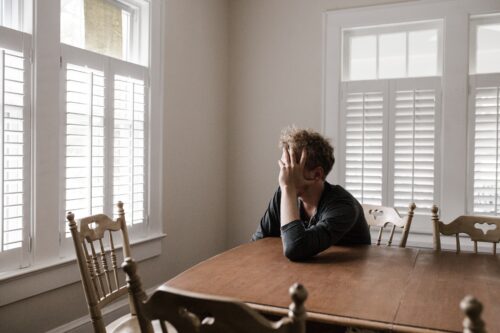Fatigue stems from a wide variety of reasons and causes. For many people who work out in a gym and go all out in a nine-to-five job, physical fatigue is a familiar feeling they can encounter, especially after working out or finishing their work and because of overtime. Others who take the challenge of doing math and academic tasks all day may experience being exhausted mentally, or sometimes they are not in the mood to do other things. Some people find this one challenging, but they need some time to think or relax before they go on.
But did you know that prevailing mental health conditions may also cause unexplained drowsiness and fatigue in your body? Check about being depressed.

Depression is a mental health condition that often causes loneliness or a general feeling of sadness and anger. Most of the time, the mood changes brought about by depression may interfere with a person’s way of life in various ways.
Depression has become a common disorder for many people (children and adults). According to the CDC, an estimated 8.1% of people living in the US, especially those 20 years old and above, had at least a 2-week persistent episode of this disorder. This medically reviewed data covers 2013 to 2016.
While being tired and depressed may differ in terms of their medical definition and underlying effects, they may also be related. Depression fatigue is a common symptom of depression that causes a persistent feeling of exhaustion, lack of energy and motivation. Depression fatigue can make it hard for someone to perform daily tasks, enjoy activities, or maintain relationships.
One primary symptom of depression is constant fatigue or feeling worn out. A recent study explained that exhaustion is regarded by at least 90% of people experiencing Major Depressive Disorder (MDD).
A lot of factors cause this bidirectional relationship. Sleep disorders, which are typical in many people with depression and mental conditions, can typically be attributed to a feeling of exhaustion. Insufficient sleep or poor sleep quality may cause a decrease in energy and, consequently, fatigue.
Stress among people is linked to the occurrence of fatigue. Chronic stress can alter the levels of neurotransmitters, such as serotonin or dopamine. Neurotransmitters play an important role in mood regulation plus overall energy throughout the day.
In some cases, antidepressant medications taken by individuals diagnosed with a mental condition may also trigger fatigue. While this medication shifts a patient’s mood towards a more positive note, it may also cause fatigue.
I Got Diagnosed With Depression
I know what it is like to suffer from sadness and drowsiness. It feels like a never-ending cycle of feeling tired or overwhelmed. The lack of energy can be completely debilitating, leaving me barely able to do anything during the day.
It feels tough to stay motivated and push through the drowsiness when it comes. I have tried many things to help with the depression and tiredness, like getting more sleep, exercising, and eating healthy. But nothing makes a difference.
I was recently diagnosed with Major Depressive Disorder and am now taking medication to help manage my symptoms. It was not my first choice, but it felt like a necessary evil that I needed to try. While the medication has helped with my mood, it has also drained and exhausted me.
Coping While Learning About My Depression Symptoms
It has been a long journey, but I’m slowly learning to cope. I am focusing on getting enough rest, eating healthy, or engaging in activities that bring me joy. I am also learning to be kind to myself plus to take time to rest or recharge.
I know that these two will always be a part of my life, but I feel determined to find ways to take control of my mental health. I am taking it one day at a time, hoping to eventually find a balance between my mental health and physical energy.
If you are struggling with it, know that you are not alone. It can be incredibly challenging to manage both at the same time, but it is possible to find a way forward.
That way, for me, was learning to be kinder to myself or to recognize when I need a break. Instead of pushing myself when I am tired, I take time to rest or recharge. I also focus on getting enough sleep by falling asleep early or eating healthy foods to keep my energy levels up.
I am still learning how to manage them but slowly finding ways to cope. I take care of myself or connect and ask for help when needed. I am also finding comfort in knowing that I am not alone.
We all experience things differently, but there is hope. With patience and self-compassion, you can also find ways to manage your symptoms and live a whole and meaningful life. It matters to be gentle or patient with yourself and remember that you are not alone.
You can manage your fatigue and sadness by caring for yourself, seeking help when needed, and connecting with others. It may not be easy, but it is possible. You can also contact and connect with professional help.
No matter how challenging these can be, there is hope with the help of the tips to calm distress. You can live a meaningful life. With patience or self-compassion, you can learn to cope with those challenges. You are not alone; some people can help if you let them in.
If you’re interested in learning more about how depression might be related to your unexplained tiredness and depression, check out the comprehensive list of FAQs provided here below:
Why Do I Feel Tired All The Time?
There could be many different reasons for you feeling tired all the time. Sometimes, it could be the obvious reasons we overlook because we do not even think it could affect us this way. One reason is vitamin deficiency. You should ensure you are all stocked up with the right vitamins or minerals your body needs.
Another reason could be stress. You might be overworking or overthinking, leading to stress, no sleep, and a poor diet. This could also be caused by diabetes, depression, and chronic fatigue syndrome.
Can Depression Cause Fatigue?
Yes, specific mental illnesses such as depression can cause a person to feel tired, as if they had just lost all their energy without even doing anything in the first place. For severe cases of depression, it causes the person to feel so tired that they would have a reason to stay in bed and not participate in a daily activity, which only furthers their depression. Make sure that you consult with a doctor when your fatigue becomes chronic because although it might not be depression, it might be something else causing it.
Can Stress Or Anxiety Make You Feel Exhausted?
The answer is yes. One of the symptoms of anxiety is fatigue or feeling tired. This may surprise some because anxiety is usually associated with high energy levels or hyperactivity. Although some people might experience fatigue after they go through anxiety attacks, for others, the fatigue could be chronic. Stress also makes you feel tired because you are constantly pressured or overworked. This can result in the inability to eat or sleep properly. This disrupts your body’s natural patterns, leaving you feeling tired.
What Are The Side Effects Of Fatigue?
Feeling tired is a normal thing for everyone. We all would feel tired, especially after a long day. This is only a sign that our body needs to rest or recharge. When we are tired, we can expect various side effects ranging from emotional, physical, and mental issues. You will be experiencing sore muscles, impaired decision-making, moodiness, appetite loss, poor focus, low motivation, and hallucinations.
What Are The 3 Types Of Fatigue?
We all feel tired at some point. However, there are three types of fatigue that you should know about so that you know how you can cope with it. First is Transient fatigue, acute fatigue caused by too many waking hours in one to two days. Second is cumulative fatigue, where there are repeated mild restrictions to your sleeping patterns, plus the third is Circadian fatigue, which refers to lower performance during a specific time during the night, referred to as the window of circadian low.

What Vitamin Do You Lack If You Are Tired All The Time?
There could be many different reasons for feeling tired. One of them is for vitamin deficiency. You might be lacking the following vitamins: vitamin D, vitamin B-12, iron, magnesium, and potassium. The best way to handle this is to increase your food intake rich in the mentioned vitamins and minerals. Another way to resolve this is to consult a doctor to identify what specific vitamin you need more.
Why Is My Energy So Low?
Several factors can affect your energy levels, depending on your lifestyle. Your sleeping patterns, eating habits, exercise, plus daily activities could affect your energy levels. You might also have low energy levels due to a medical condition you are unaware of, such as low testosterone or even depression. Another cause for your low energy levels is your mood or stress. Your overworking might drain you. You might even be putting yourself at risk of pushing or pressuring yourself a little too much than you should be.
How Can I Boost My Energy Level?
According to Harvard University, there are many ways for a person to boost their energy levels. However, the following are most effective when boosting your energy levels. First, to control your stress, make sure you lighten your workload. Apart from that, exercise to keep your body healthy by avoiding smoking and too much alcohol. Ensure that you get the right amount of sleep plus eat properly with regular drinks of water.
What Vitamins Should I Take If I’m Always Drowsy?
It would be best to try to increase your intake of food and juices that could help with your vitamin deficiency. So try up your Vitamin D intake, Vitamin B12, iron, magnesium, and potassium. This will help you regain your energy levels. It might stop your body from feeling tired all the time. You can also take multivitamins that help with your vitamin levels.
How Do I Stop Being Lazy?
Sometimes, we all feel lazy at some point in our day or life. It is normal to have lazy days occasionally. Still, when it goes beyond that, and laziness becomes a regular thing for you, it becomes terrible. You can avoid being lazy. Make sure that you avoid all distractions. This can help you create a plan and start talking to yourself and speaking more positively about it. You can also use your strengths to your advantage and acknowledge your accomplishments as you go.
How Do You Fix Fatigue Quickly?
Fatigue could be caused by many different factors that could be treated differently. So make sure to identify the source of your fatigue; this way, you can find a way to fix it. If it is caused by vitamin deficiency, increase your intake of vitamins and minerals. If it is caused by stress or mood swings, take a step back, breathe, and relax. If your bad sleeping habits cause it, make sure you can change it up and stick to a specific pattern that helps you rest better. Different factors causing one problem can also have different solutions.
What Is A Natural Energy Booster?
The best way to naturally boost your energy is to exercise. Whenever we exercise, our oxygen-enriched blood surges through our body and to different parts such as our brain, heart, and muscles. Squeeze in at least ten minutes of exercise into your day. You can keep your energy levels at a reasonable level.
Why Am I Always Tired And Have No Energy?
Several different factors could cause your fatigue. This could be because of bad lifestyle habits such as wrong sleeping patterns, eating habits, chronic stress, mood swings, and even vitamin deficiency. However, this could also be caused by medical issues such as depression. One of the symptoms of depression is chronic fatigue, so if this becomes an issue, make sure that you consult with a doctor.
What Illnesses Can Cause Extreme Tiredness?
Several medical issues could cause fatigue. From physical illnesses to mental illnesses, there could be different issues that result in extreme fatigue. One of these illnesses is depression, where you might feel too tired with deficient energy levels. Whatever the case may be, make sure to consult with a doctor to get the help you require.
Why Am I Still Tired After Sleeping?
This might be because your body still lacks the rest that it requires, and maybe it could be because it lacks the vitamins needed to fully sustain your body’s energy levels. This could also be because you are so stressed that your mind still does not rest even when it needs to rest. You can also try to consult with a doctor to correctly identify this issue’s root cause.
Why Do I Feel So Tired?
There is a medical condition referred to as Chronic Fatigue Syndrome or CFS. This condition can cause you to feel overly exhausted and even make you feel weak even when you get more than enough sleep and rest. This condition can also cause insomnia, and because of this, your body does not feel as if it has fully rested.
Conclusion
Tiredness and depression are difficult conditions to experience or feel. These unpleasant symptoms may even interfere with people’s everyday work and life responsibilities. With that, it is essential to prioritize urgent medical help. Depression-linked fatigue must not be ignored because it can lead to panic attacks or substance abuse.

If you have been experiencing recurring episodes of exhaustion despite having no underlying medical condition, visit the nearest healthcare department or institution. Diagnosing any particular condition, like depression-linked fatigue, is impossible without professional help. Diagnosing may entail health-related questions, lab and physical exams, and even an assessment of overall symptoms.
Treatment recovery for these conditions requires consistent counseling and therapy sessions with a licensed healthcare provider. Your therapist may accustom you to various therapy techniques to find what would fit your choices. Some recommendations include changing the sleeping pattern and work lifestyle. They might also suggest doing light meditative activities such as yoga and stretching. Moreover, they might also recommend a diet or meal plan.
A psychiatrist may also recommend taking safety medication such as antidepressants or mood-stabilizing medicines to support your ongoing therapy. Scheduling with a doctor can also help determine if you have an undiagnosed health condition other than your depression. At times, underlying conditions may contribute to persistent sadness or anxiety, and fatigue.
Being cured of tiredness and depression may take time, but it is always possible. With early diagnosis and consistent adherence to medication options, you can enjoy the proactive and healthy life you always wanted in no time. Cooperation and developing a good relationship with your preferred healthcare provider can also be beneficial. It can serve as motivation to go back for therapy and consultation follow-ups.
FAQs
Is tiredness a form of depression?
Tiredness, also known as fatigue, is not a form of depression, but it is a common symptom of depression. When someone is experiencing depression, they often feel fatigued or lethargic as a result of the emotional and mental toll that depression takes on their energy levels.
Can depression make you more tired than normal?
Tiredness, also known as fatigue, is not a form of depression, but it is a common symptom of depression. When someone is experiencing depression, they often feel fatigued or lethargic as a result of the emotional and mental toll that depression takes on their energy levels.
What type of fatigue is depression associated with?
Depression is associated with a type of fatigue often referred to as “psychomotor retardation.” This type of fatigue involves a slowing down of physical and mental processes. People with depression may feel physically and mentally sluggish, making it difficult to carry out daily tasks.
Why am I so tired all of the time?
There are many potential reasons for feeling tired all of the time, and it’s important to consider various factors, including lifestyle, sleep patterns, physical health, and mental well-being. Common causes of persistent tiredness can include inadequate sleep, excessive stress, poor diet, medical conditions, and, yes, depression. If you’re consistently tired, it’s advisable to consult a healthcare professional to determine the underlying cause.
What mental illness makes you tired?
Various mental illnesses can contribute to feelings of tiredness or fatigue. Besides depression, conditions such as anxiety disorders, bipolar disorder, and chronic stress can also lead to fatigue. Each of these conditions affects energy levels differently, and it’s crucial to seek professional help to properly diagnose and manage any mental health concerns related to fatigue.
If you or someone you know is experiencing persistent fatigue or symptoms of mental illness, it’s essential to consult with a healthcare provider or mental health professional for a proper evaluation and guidance on treating depression.




